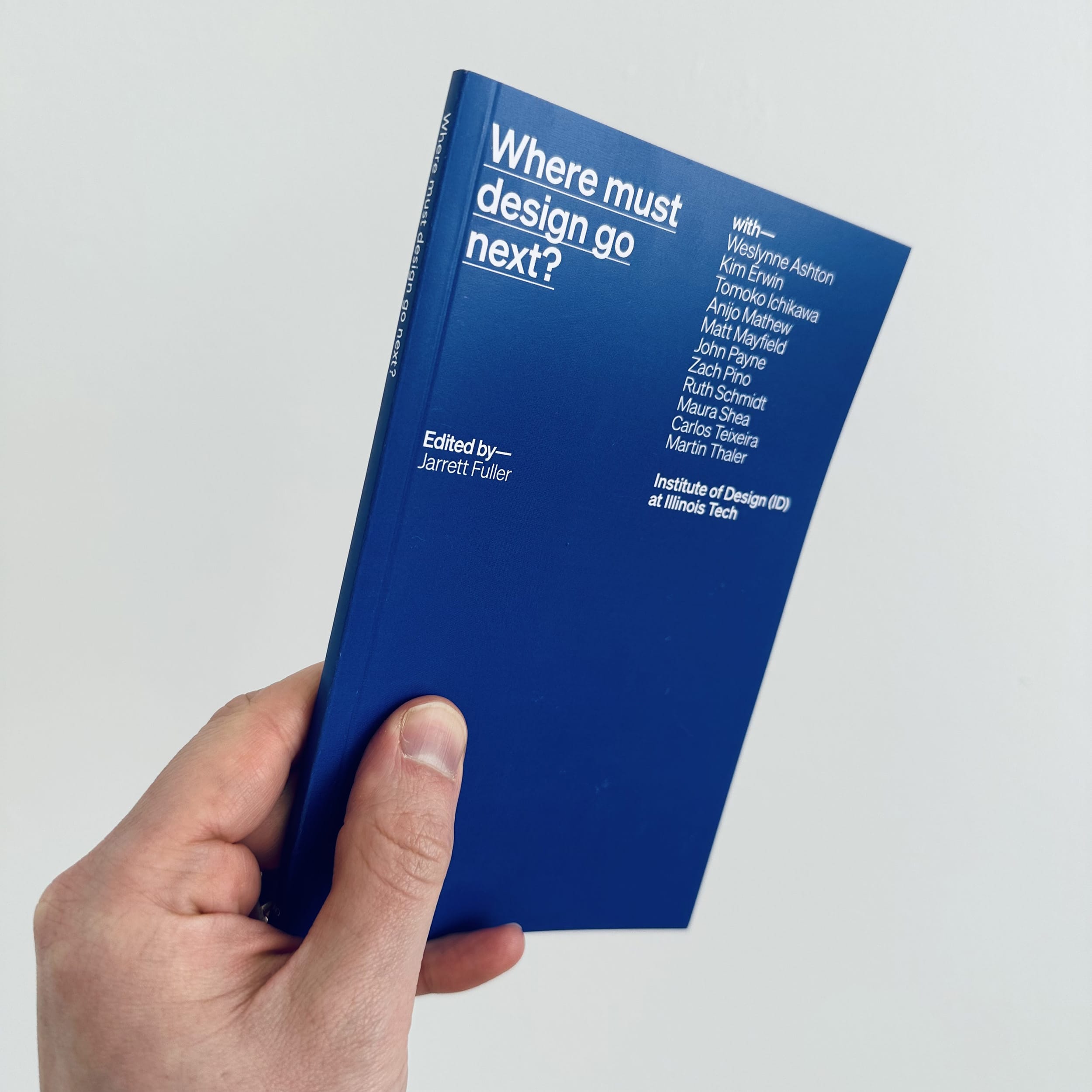My new book! Where Must Design Go Next?
I have a new book out! It’s called Where Must Design Go Next? and it’s published by Oro Editions in collaboration with the Institute of Design (ID) at Illinois Tech. You can purchase it here.
Here’s ID’s announcement for the book.
This book is the result of my 2022-23 fellowship at ID. The Latham Fellowship, named for former ID professor Richard Latham who was interested in using design to make strategic impact on business and culture. As ID says:
Latham Fellows connect to Latham’s philosophy and are selected because of their ability to challenge the boundaries of design and transfer knowledge about design and its value. Fellows give a lecture hosted by ID and share their emerging ideas with the ID community and the wider public by publishing freely available papers, articles, or other presentations.
My fellowship, however, broke from this tradition. Throughout 2023, ID was celebrating its 85th anniversary, both looking back and looking ahead. The school, famously, was founded by Laszlo Moholy-Nagy, originally as The New Bauhaus, and has been influential in shaping design education in the United States. I used my fellowship to engage with ID to think about the future of design practice, pedagogy, and theory.
This first manifested itself through With Intent, a six-episode podcast series. I hijacked the school’s existing podcast, guest hosting their second season by featuring roundtable discussions with faculty at ID about the big questions in design today: what is the point of foundations classes, what if human centered design isn’t enough, how do designers enter complex systems, etc. These conversations proved insightful and generative: it became a way for me to both understand how ID thinks about design today (and what they are interested in as a community) but also as a way for me to better understand my own feelings — what excites me, what frustrates me, what confuses me — about design and design education day.
This new book, Where Must Design Go Next?, is a highly edited version of these conversations. Organized around the same central questions and supplemented with footnotes, extra reading, and more, the book is a short, 100 page document of conversations with faculty at ID. The goal was for this to be a handbook of sorts, a little publication of stimulating conversations about the future of design. I both edited and designed the book and wrote an original introduction.
ID has identified four phases in its history: Experimentation, Systems Designs, and Human-Centered Design. The current phase — as of yet-unnnamed — builds on each of these to apply design to the environment, to culture, to the next generation. Do we call this humanity-centered? Multigenerational? Collaborative? I’m not sure but this book, I think, start to point towards some ideas.
What I like about these phases, of course, is they are not just the history of ID but the history of design at large. By looking at the history of ID, we can see how design thinking has evolved from a field of formal invention to the incorporation of systems thinking to the emergence of human-centered and design thinking methodologies. Designers and design educators around the world are wrestling with questions about how to practice and teach design today in a time of increased unrest, uncertainty, and precarity. Design, I believe, has a place in understanding the problems and opportunities of our time and these conversations sketch out some models to do that.
My hope is we can use the work happening at ID as a lens to talk about larger movement of design, this book becoming a blueprint for design’s possible futures. I hope you get as much from these conversation as I did.
Where Must Design Go Next? is published by Oro Editions and the Institute of Design (ID) at Illinois Tech. It features conversations with ID faculty Weslynne Ashton, Kim Erwin, Tomoko Ichikawa, Anijo Mathew, Matt Mayfield, John Payne, Zach Pino Ruth Schmidt, Maura Shea, Martin Thaler, and Carlos Teixeira.
You can purchase it here or listen to the original extended interviews on the With Intent podcast.
